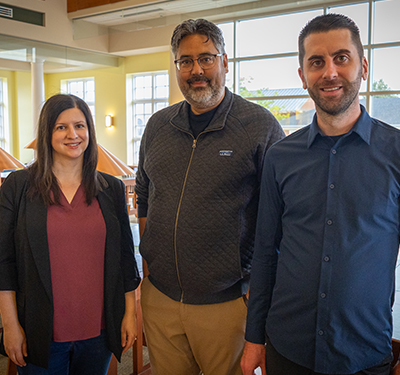
Psychology Professor Dr. Sarah Vannier, Gerontology Professor Dr. Albert Banerjee, and Sociology Professor Dr. Anthony Jehn have been awarded SSHRC Insight Development Grants to support their research projects.
Insight Development Grants support research in its initial stages. The grants enable the development of new research questions, as well as experimentation with new methods, theoretical approaches and/or ideas. Funding is provided for short-term research development projects of up to two years that are proposed by individuals or teams.
"Sexual Competence at First Sex: Parent Influences and Implications for Sexual Well-Being"– Dr. Sarah Vannier
 Dr. Sarah Vannier's research, "Sexual Competence at First Sex: Parent Influences and Implications for Sexual Well-Being," investigates the relationship between adolescents' first experience of sex and their sexual health and well-being, as well as the role of parenting in supporting healthy adolescent development.
Dr. Sarah Vannier's research, "Sexual Competence at First Sex: Parent Influences and Implications for Sexual Well-Being," investigates the relationship between adolescents' first experience of sex and their sexual health and well-being, as well as the role of parenting in supporting healthy adolescent development.
"This grant allows us to work with teens and parents to understand how family relationships shape young people's sexual health," said Dr. Vannier.
"I am especially excited to be doing research that treats adolescent sexuality as a normal and important part of development, not just a set of risks to avoid. The goal is to identify ways parents can help teens make choices that support their well-being."
Dr. Vannier's research is being conducted in collaboration with STU graduate Claire Leighton, BA’22, who, during her time at STU, designed a third-year research methods project on parenting and adolescent sexual behaviour, which expanded over the course of the last few years and led to this SSHRC project.
"My favourite thing about this project is that it came directly out of student work. It has been fun for me to work with an early-career researcher like Claire, who brings such strong research ideas to the table."
"Aging for mortals?: Exploring Yoga's Contribution to Contemplative Gerontology"– Dr. Albert Banerjee
 Dr. Albert Banerjee's research titled "Aging for mortals?: Exploring Yoga's Contribution to Contemplative Gerontology" advances scholarly knowledge on the transformative aspects of yoga, contributing to contemplative approaches to aging and mortality, and enhancing our understanding of cross-cultural translation.
Dr. Albert Banerjee's research titled "Aging for mortals?: Exploring Yoga's Contribution to Contemplative Gerontology" advances scholarly knowledge on the transformative aspects of yoga, contributing to contemplative approaches to aging and mortality, and enhancing our understanding of cross-cultural translation.
This research will provide lessons from the work yogis have done supporting themselves and open space for discussions about other traditions and approaches to living well as mortal beings.
"This study aims to learn from yoga. Too often, we use yoga to achieve conventional healthcare goals, such as improving fitness, increasing flexibility, or reducing stress. But what if engaging with yoga transformed these goals? What if yoga could change how we understand what health means or what success looks like? The ancient practice of yoga grappled with profound questions of impermanence,” said Dr. Banerjee.
"The beauty of this funding is that it allows me to engage with yogic experts to explore some of these more profound questions. And these are questions that have much to offer us in learning to live well with limitation, to live sustainably, compassionately and to live well as mortal beings."
"High School Academic Performance and Substance Use in Adulthood: Ontario Pilot Study"– Dr. Anthony Jehn
 Dr. Anthony Jehn's research titled "High School Academic Performance and Substance Use in Adulthood: Ontario Pilot Study" will create an unprecedented opportunity to link high-quality, population-level data on substance use with a wide range of education data, enabling an examination of how high school academic performance indicators relate to the likelihood and frequency of substance use in adulthood.
Dr. Anthony Jehn's research titled "High School Academic Performance and Substance Use in Adulthood: Ontario Pilot Study" will create an unprecedented opportunity to link high-quality, population-level data on substance use with a wide range of education data, enabling an examination of how high school academic performance indicators relate to the likelihood and frequency of substance use in adulthood.
The project team will disseminate study findings to promote the development of more equitable and effective interventions addressing the ongoing challenges of substance use in adulthood.
"My funded project will identify at-risk youth based on academic markers, aiding in the design of school-based interventions intended to reduce substance use later in life," said Dr. Jehn.
"This research will explore how these relationships may vary across marginalized populations, including students with disabilities, racial and ethnic minorities, newcomers to Canada, Indigenous youth, and individuals from lower socioeconomic backgrounds."
By participating in policy-driven initiatives, the project will deliver essential evidence-based and policy-oriented information for implementing effective interventions and policies to mitigate substance use in adulthood.
-(2).jpg)
/filters:format(webp)/prod01/stuca/media/stu/site-assets/images/features/DalCupnews.jpg)
/filters:format(webp)/prod01/stuca/media/stu/site-assets/images/events/Research-and-Ideas-news-2026.png)
/filters:format(webp)/prod01/stuca/media/stu/site-content/news/DeansListnews.jpg)